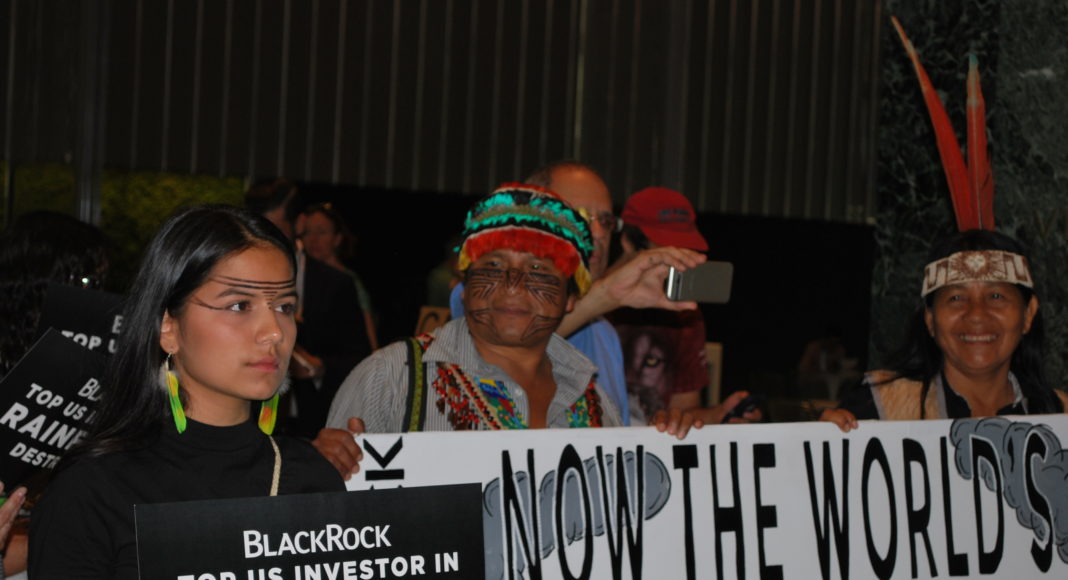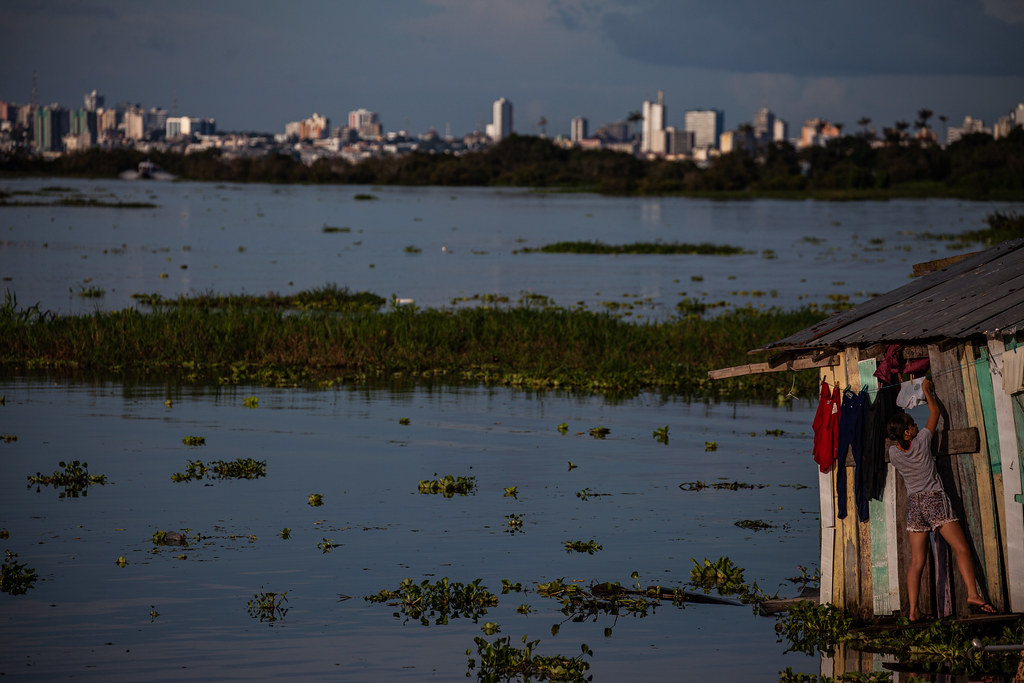A number of indigenous leaders from the Amazon were at the forefront of climate action events in New York 19-28 September 2019. The protests, rallies and symposia were organised around the UN Climate Action Summit that took place alongside the annual UN General Assembly.
Linda Etchart was there for LAB and interviewed a number of the leaders. In the second of three blog-posts, she focuses on the young members of the delegations, some little older than Greta Thunberg. You can read the first article here.
Helena, 17 years old and a participant at a youth event at the UN Secretariat, also spoke at the indigenous-initiated session ‘Voices and Innovative Solutions for Climate Justice’ on Sunday 22 September, an event organised to promote the Hahku Foundation that provides promotion and a market for Amazonian women´s handicrafts as a source of income for indigenous peoples.
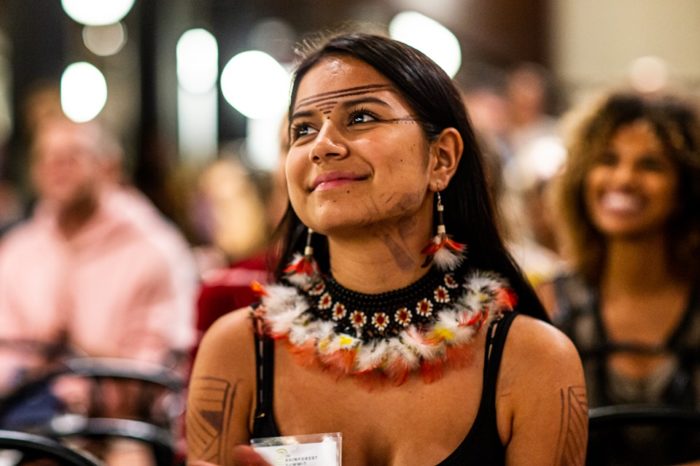
Leo Cerda, founder of the Hakhu Foundation and one of the participants of the Rainforest Summit panel chaired by Helena Gualinga said: ‘We must stop talking and take action. There are two points: one of the immediacy of the situation. First, we have to support people on the frontlines to put out the fires. Second, we need structural change. We cannot continue to put out fires every year. How can we make that happen? How can we prevent loggers, invaders, agri-business and the fossil fuel industry? We have the momentum right now.’
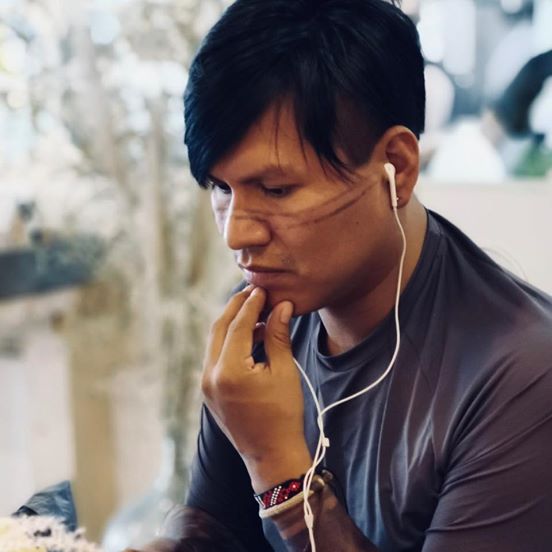
‘I am from Ecuador. I was raised in the forest, and moved to the city. I was invited to Brazil a few weeks ago to see first-hand what was happening.’
The indigenous people were trying to put out the fires themselves. They did not have water or masks. Brazil has received US$20 million dollars to put out the fires. Where are those $20 million dollars?
His words were echoed in a presentation and film-showing by biologist Paul Rosolie, renowned environmental activist, who works with Juan Julio Durand of JungleKeepers.
Rosolie’s film footage demonstrated the destruction of the forest and of the animal habitat in the province of Madre de Dios in the Peruvian Amazon. And Rosolie asked why it was that school children in Bolivia, teenage boys of 13 to 15 years old, with no fire-fighting equipment, were quitting school to put out fires in their country, while President Evo Morales refused to declare a national emergency.
The indigenous people were trying to put out the fires themselves. They did not have water or masks. Brazil has received US$20 million dollars to put out the fires. Where are those $20 million dollars?
–Leo Cerda
Rosolie’s film illustrated the damage to the ecosystem wrought by gold mining in Madre de Dios province, in Peru, and the building of a road and bridge across the Rio Piedras, a place which formerly was the home of thousands of species of animals, which are now gone, to be replaced by silence. The silence is spreading and threatens the entire Amazon region.
Leo Cerda continued: ‘We must support capacity-building programmes to that we can take control of our territories and resources. We must find better ways. Let us end the middle man and support people directly. We are tired and we should not be doing this. Helena [Gualinga] is 17 years old and she should not be doing this.’
‘We are not all going back to indigenous ways. We have to approach this realistically. We must support projects that enable sustainable communities to survive. We must pressure our governments to support people who are suffering. When I asked indigenous people in Brazil what is their message to the world, they said “We need you to tell our government to guarantee the survival of our forest.”’
Leo pointed out that ‘We have the technology and the creativity to make a change in the capitalist system and consumerism. We do not need any more fossil fuel extraction. Who is benefiting from the extraction of fossil fuels? The corporations and the investors. Extraction of oil is not benefiting the indigenous peoples, it is not benefiting the planet. In Ecuador, it is more expensive to dig up the oil and pollute the soil and the water than the value of the oil itself. We have to think about the long term, and target the corporations.’
The Amazon versus BlackRock
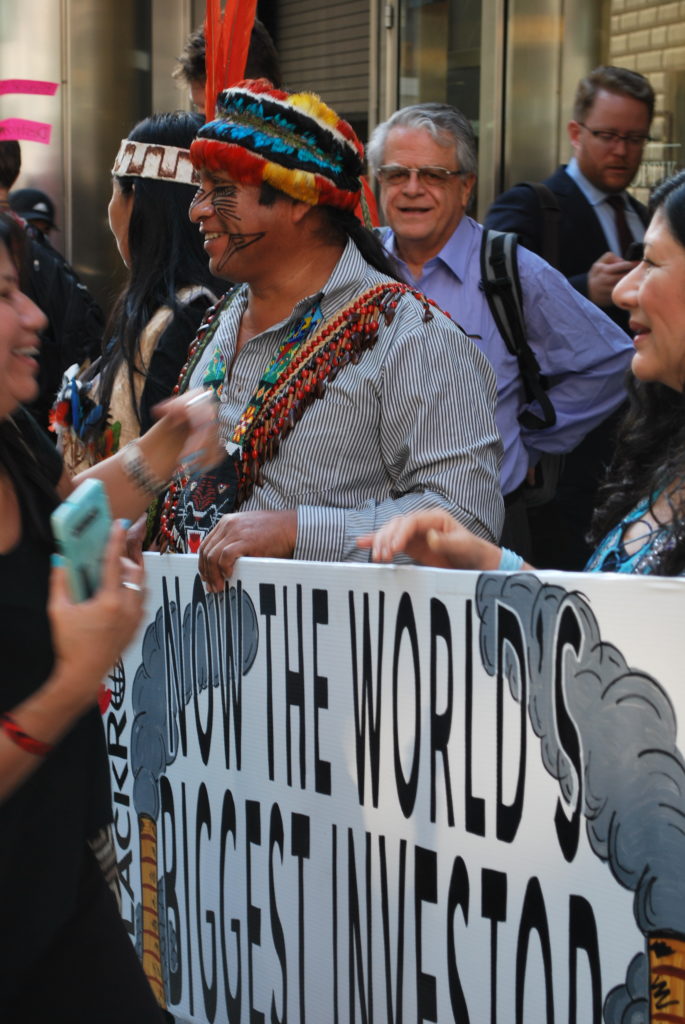
Helena Gualinga, as well as being a youth representative at the UN, was one of a group of protestors and activists who rallied on 24 September outside the New York headquarters of BlackRock, the US-based global investment management corporation, with $6.84 trillion in assets under management, making it the world’s largest (August 2019). Despite their efforts to present themselves as leaders in corporate social responsibility, including in environmental protection, BlackRock are the biggest investors in extractive industries in the Amazon region. A protest group including two indigenous Ecuadorian Amazonian leaders, Gloria Ushigua of the Sápara people and Domingo Peas of the Achuar, entered the BlackRock building, held banners and chanted, as a petition with 260,000 signatures was presented to company executives. The petition was supported by Allies from Amazon Watch, Daily Kos, CREDO Action, RAN, MoveOn, the Sierra Club, NYCC, Friends of the Earth US, and Green America.
At the rally, Helena Gualinga – speaking in English — denounced BlackRock for having being responsible for the murder of indigenous people who have been attempting to halt the burning of forests in Brazil and Bolivia: ‘Whoever is listening, I beg you to stop, to stand with us, as you are killing my people, and killing the world. Shame on BlackRock.’
On 23 September, Marina Silva, Minister of the Environment for Brazil under the Lula da Silva Administration (2003- 2008), and one of the architects of REDD+ – was a keynote speaker at a conference ‘Deforestation and the Future of the Amazon’, organised by Professor Salo Coslovsky, at NYU Wagner campus. Guest speakers include Tabata Amaral, who was recently elected to Brazilian Congress at age 25; Tulio Gadelha, newly elected to Congress at age 31; Marina Helou, newly elected to the São Paulo State Assembly; Natalie Unterstell, activist for environmental and indigenous people’s rights; and Brenda Brito, lawyer and researcher on land use rights in the Amazon.
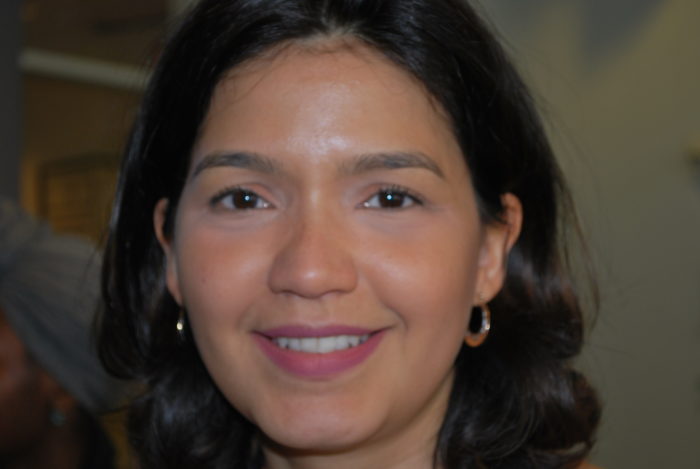
Brenda Brito argued the case for a green economy in Brazil: ‘Brazil knows how to increase production while reducing deforestation.’ She pointed out that deforestation for cattle ranching was inefficient: cleared rainforest can support only one head of cattle per hectare. Tabata Amaral echoed Brito by saying that development is not the opposite of sovereignty, and that Brazil will not be developed by deforestation. She challenged Bolsonaro’s claims that Brazil must exercise sovereignty over its own rainforest, saying that Brazil’s signing of climate agreements are examples of successful assertion of sovereignty.

Marina Helou, representative for REDE in the state of São Paulo, works with other state legislatures to build up alliances to reinforce and implement state laws to protect the environment. She advocated working with the Brazilian private sector, a number of whose representatives have been making efforts to contribute to environmental initiatives. She and Natalie Unterstell took a conciliatory approach in arguing for compromise and working with enemies as part of a democratic process and pressing for divestment rather than boycott, arguing that boycotts will damage the interests of those companies who work for sustainable development in Brazil. The young Brazilian parliamentarians demanded monitoring by the international community, particularly by buyers who they said should insist on certification of supply chains: the power of the consumer.
A Marshall Plan to save the Amazon
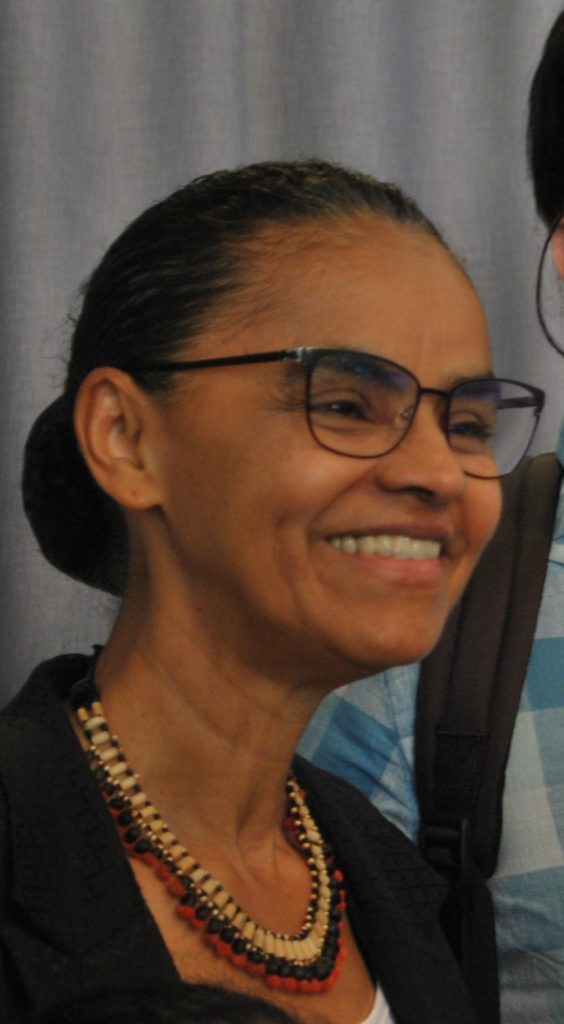
Marina’s speech was followed by an intervention by Domingo Peas, Amazonian Ecuadorian Achuar indigenous leader and representative of the Amazonian Indigenous Ecuadorian Federation (CONFENIAE), who endorsed Marina Silva’s words. Peas called for support for the COICA initiative to declare as untouchable a large section of land that incorporates the headwaters of the Amazon, covering seven countries, Bolivia, Brazil, Colombia, Ecuador, Guyana, Peru and Suriname, a vast area that has been protected by the indigenous peoples for millennia: ‘We have to look within ourselves to protect nature, who protects us. I call on institutions and investors to take their money out of destructive industries. We come into this world with nothing, and we leave with nothing. We must open a new road away from the path of self-destruction. I want to thank Marina [Silva] for the beautiful message she brings. We have to change direction and seek a different way of life.’
Marina Silva, a key actor in the UNFCCC’s acceptance of REDD+ in 2005, and described at the conference as ‘the most successful environment minister ever’, also stressed the need for compromise and negotiation in what she called the dense fog of speeches and pronouncements. Marina Silva listed the achievements of her ministry when in office: deforestation reduced by 80 per cent, the cancellation of 60,000 illegal land titles, and the arrest of 730 environmental felons. She said that the indigenous peoples of Brazil were protecting Brazil’s sovereignty: the attention on the fires is not a tragedy: it provides an opportunity for regional and global action. Marina Silva warned that President Bolsonaro was attempting to give indigenous Brazilians the right to sell their land, by awarding them private property rights, but that indigenous peoples were resisting. She called for an equivalent of a Marshall Plan to save the Amazon, as well as certification of Brazilian products.

